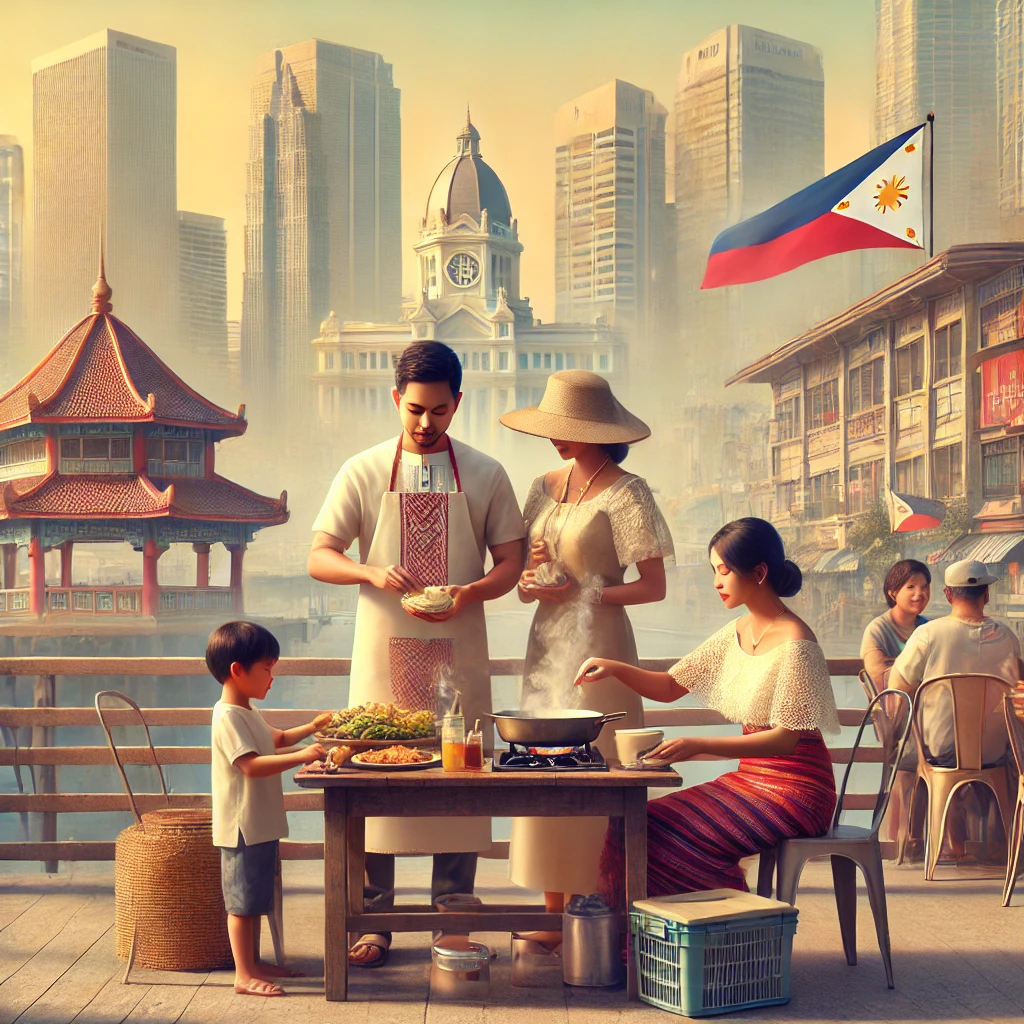The Filipino diaspora represents one of the largest global migrations in modern history. As millions of Filipinos have spread across the world in search of better opportunities, they have carried with them a rich tapestry of cultural values and traditions. This blog explores the intricate dynamics of maintaining Filipino cultural identity abroad, examining the core values that persist, the challenges faced, and the strategies employed by Filipino communities to preserve their heritage in foreign lands.
The Philippines, an archipelagic nation with a complex history of colonial influences and indigenous traditions, has cultivated a unique set of values that form the bedrock of Filipino identity. These values, deeply ingrained in the Filipino psyche, continue to play a crucial role in shaping the lives of Filipinos abroad, influencing their interactions, decision-making processes, and overall worldview.
As we delve into this topic, we will explore the fundamental Filipino values, their manifestation in diaspora communities, the challenges of cultural preservation, and the various ways in which Filipinos maintain their cultural identity while adapting to new environments. This examination will provide insights into the resilience and adaptability of Filipino culture in the face of globalization and cross-cultural encounters.
Core Filipino Values
Family-Centricity
At the heart of Filipino culture lies a profound emphasis on family. This value extends beyond the nuclear family to encompass extended relatives and even close friends who are often considered family. In Filipino communities abroad, this family-centric approach manifests in various ways:
- Regular gatherings and celebrations
- Financial support for family members in the Philippines
- Multigenerational households
- Strong involvement in children’s lives and education
- Prioritization of family needs over individual desires
This deep-seated value of family unity serves as an anchor for Filipinos living abroad, providing emotional support and a sense of belonging in unfamiliar environments.
Bayanihan Spirit
The concept of “Bayanihan” embodies the Filipino value of communal unity and cooperation. Traditionally referring to the practice of community members helping a neighbor physically move their house, Bayanihan has evolved to represent a broader spirit of collective effort and mutual assistance. In diaspora communities, this value manifests through:
- Community organizations and support groups
- Volunteer efforts for fellow Filipinos in need
- Collective fundraising for disaster relief in the Philippines
- Mentorship programs for newly arrived immigrants
- Collaborative cultural events and celebrations
The Bayanihan spirit fosters a sense of community among Filipinos abroad, creating a support network that helps individuals navigate the challenges of living in a foreign country.
Respect and Hospitality
Respect for elders and authority figures, coupled with genuine hospitality, are hallmarks of Filipino culture. These values continue to play a significant role in the lives of Filipinos in the diaspora:
- Use of honorific terms when addressing elders
- Seeking advice and blessings from older family members
- Warm welcome and generous hospitality towards guests
- Respect for local laws and customs in host countries
- Maintaining polite and courteous behavior in social interactions
These values not only help Filipinos maintain their cultural identity but also often contribute to their positive reception in host countries, facilitating better integration and cultural exchange.
Faith and Spirituality
Religion, predominantly Christianity, plays a central role in Filipino culture. For many Filipinos abroad, faith serves as a cornerstone of their identity and a source of strength:
- Regular attendance at religious services
- Participation in faith-based community groups
- Celebration of religious festivals and traditions
- Incorporation of religious symbols and practices in homes
- Reliance on faith for guidance and comfort in challenging times
Religious institutions often serve as cultural hubs for Filipino communities abroad, providing not only spiritual nourishment but also a space for cultural preservation and community building.
Challenges in Maintaining Cultural Identity
Generational Differences
One of the most significant challenges faced by Filipino diaspora communities is the generational gap in cultural understanding and adherence. This manifests in several ways:
- Language barriers between older and younger generations
- Differing levels of acculturation to the host country’s culture
- Varying interpretations of traditional Filipino values
- Conflicts arising from intergenerational expectations
- Challenges in passing down cultural knowledge and practices
These generational differences can lead to a gradual erosion of cultural identity over time, as younger generations may feel more connected to their host country’s culture than to their Filipino heritage.
Cultural Assimilation Pressures
Filipinos living abroad often face pressure to assimilate into their host country’s culture, which can challenge the maintenance of their cultural identity:
- Workplace expectations that may conflict with Filipino values
- Social pressures to conform to local norms and practices
- Educational systems that may not prioritize cultural diversity
- Media influences that promote Western or local cultural ideals
- Limited access to Filipino cultural resources and experiences
Balancing the desire to integrate successfully with the need to maintain cultural identity can be a complex and sometimes stressful process for many Filipinos in the diaspora.
Geographic Dispersion
The wide geographic dispersion of Filipino communities in many countries can pose challenges to cultural maintenance:
- Difficulty in forming cohesive Filipino communities in some areas
- Limited access to Filipino goods, services, and cultural events
- Reduced opportunities for regular interaction with other Filipinos
- Challenges in organizing large-scale cultural celebrations
- Increased likelihood of cultural isolation in areas with few Filipinos
This dispersion can lead to a sense of cultural disconnection and make it more challenging to create the supportive networks that are crucial for cultural preservation.
Strategies for Cultural Preservation
Community Organizations and Cultural Centers
Filipino community organizations and cultural centers play a vital role in preserving and promoting Filipino culture abroad:
- Organizing cultural events and festivals
- Providing language classes and cultural education programs
- Offering support services for new immigrants
- Creating spaces for community gatherings and celebrations
- Advocating for Filipino interests in the host country
These organizations serve as hubs of Filipino culture, providing resources and opportunities for community members to connect with their heritage and with each other.
Digital Connectivity and Social Media
The digital age has provided new tools for cultural preservation and connection:
- Social media groups for Filipino communities abroad
- Online platforms for sharing Filipino news, music, and entertainment
- Virtual cultural events and webinars
- Digital archives of Filipino cultural resources
- Easy communication with family and friends in the Philippines
These digital tools help bridge geographic distances and provide accessible means for Filipinos to stay connected with their culture and community.
Cultural Education Initiatives
Many Filipino communities abroad have developed educational initiatives to pass on cultural knowledge to younger generations:
- Weekend Filipino language and culture schools
- Youth mentorship programs focused on cultural heritage
- Cultural workshops and seminars for all ages
- Integration of Filipino history and culture in community events
- Partnerships with local schools to promote Filipino cultural awareness
These educational efforts aim to ensure that younger generations of Filipinos abroad have a strong foundation in their cultural heritage.
Impact of Cultural Preservation Efforts
The efforts to maintain Filipino cultural identity in the diaspora have had significant impacts on both individual Filipinos and their host societies:
Individual Well-being
Research has shown that maintaining a strong cultural identity can have positive effects on individual well-being:
- Enhanced sense of belonging and self-esteem
- Better coping mechanisms for stress and challenges
- Stronger family and community bonds
- Increased resilience in the face of discrimination
- Greater overall life satisfaction
These benefits underscore the importance of cultural preservation efforts for the mental and emotional health of Filipinos living abroad.
Cultural Enrichment of Host Societies
The preservation and sharing of Filipino culture contribute to the cultural diversity and richness of host societies:
- Introduction of Filipino cuisine to local food scenes
- Cultural festivals that attract diverse audiences
- Contributions to arts, music, and literature in host countries
- Promotion of cultural understanding and tolerance
- Economic contributions through Filipino-owned businesses and cultural tourism
This cultural exchange enhances the multicultural fabric of host societies, fostering greater global understanding and appreciation for diversity.
Statistical Overview of the Filipino Diaspora
To provide a clearer picture of the Filipino diaspora, let’s examine some key statistics:
| Metric | Value | Year |
|---|---|---|
| Total Overseas Filipino Population | 10.2 million | 2013 |
| Percentage of Philippine Population Abroad | 10.2% | 2013 |
| Top Destination Countries | 1. United States 2. Saudi Arabia 3. United Arab Emirates 4. Canada 5. Malaysia | 2013 |
| Remittances to Philippines | $28.1 billion | 2016 |
| Percentage of GDP from Remittances | 10.2% | 2016 |
Source: Commission on Filipinos Overseas, Bangko Sentral ng Pilipinas
These statistics highlight the significant scale of the Filipino diaspora and its economic impact on the Philippines. The widespread distribution of Filipinos across various countries underscores the importance of cultural preservation efforts in maintaining a cohesive Filipino identity abroad.
Conclusion
The maintenance of Filipino cultural identity in the diaspora is a complex and ongoing process that involves both challenges and opportunities. Core Filipino values such as family-centricity, Bayanihan spirit, respect, hospitality, and faith continue to play crucial roles in shaping the lives and experiences of Filipinos abroad. While challenges such as generational differences, assimilation pressures, and geographic dispersion pose threats to cultural preservation, Filipino communities have developed various strategies to maintain their cultural heritage.
Community organizations, digital connectivity, and cultural education initiatives serve as powerful tools in the effort to preserve and promote Filipino culture in foreign lands. These efforts not only benefit individual Filipinos by enhancing their sense of identity and well-being but also contribute to the cultural enrichment of their host societies.
As the Filipino diaspora continues to grow and evolve, the task of maintaining cultural identity will remain a priority for Filipino communities worldwide. By adapting traditional values to new contexts and leveraging both old and new methods of cultural transmission, Filipinos in the diaspora demonstrate the resilience and adaptability of their cultural heritage. This ongoing process of cultural preservation and adaptation ensures that Filipino identity remains vibrant and relevant in an increasingly globalized world.
Disclaimer: The information presented in this blog is based on data available up to 2017. While efforts have been made to ensure accuracy, some details may have changed since then. Readers are encouraged to consult current sources for the most up-to-date information. If you notice any inaccuracies, please report them so we can correct them promptly.




